How to fix the Dirty COW vulnerability on Raspberry Pi

Dirty COW is a privilege escalation vulnerability found in the Linux kernel. Although it’s been there for nine years, it’s only recently been identified.
The vulnerability, which affects the 'copy-on-write' (COW) mechanism, can be found in most Linux distros, and since the Raspberry Pi runs Linux, it too is at risk.
Canonical explains Ubuntu Advantage benefits -- could your business switch to Linux?
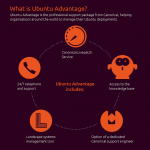
Linux-based desktop operating systems are better than Windows because they are free, right? Whoa there, folks. Neither are necessarily better or worse -- it really depends on your needs. Cost-free operating systems, such as Ubuntu and Fedora, are definitely great for home consumers looking to breathe new life into old machines. With that said, the benefits of Linux extend beyond money and cost-savings.
Linux being free is sort of misleading when it comes to business use too. While a small business with a few employees can sometimes get by without paying for support, larger companies would be crazy to go it entirely alone -- paid support is a necessity for success. Today, Canonical releases a well-designed infographic that explains the benefits of its paid support, called 'Ubuntu Advantage'.
Netrunner Core 16.09 'Avalon' Debian-based KDE Linux distro now available for download
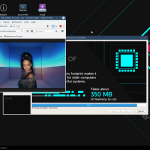
The gift and curse of desktop Linux-based operating systems is the ability to change the desktop environment. On one hand, having the choice to pick your favorite user interface, such as Unity, GNOME, or KDE Plasma, can be a huge positive. On the other, this also creates fragmented experiences between Linux users.
If you are a fan of KDE Plasma, there are plenty of quality distributions available. The overall best for home users, however, is the wonderful Netrunner. You'd be hard-pressed to find another KDE-focused distro with such care and focus on the user experience. Today, a specialized version of the Debian-based operating system, called Netrunner Core, becomes available for download. This pared-down OS is designed for lower-end systems, and there are images for both x86 and ARM.
Serious Dirty COW bug leaves millions of Linux users vulnerable to attack

A vulnerability discovered in the Linux kernel has been present for nine years, and users are being advised to seek out and install a patch as soon as they possibly can. Dubbed Dirty COW, the bug is a privilege escalation vulnerability which can be found in just about every Linux distro out there.
Discovered by security expert Phil Oester, Dirty COW is described as one of the most serious bugs of its type ever found in Linux. Assigned the code CVE-2016-5195, there is evidence that the vulnerability has been exploited and a website set up to alert people to the problem advises that the "security community should deploy honeypots that entrap attackers and to alert about exploitation attempts".
How to enable free 'Canonical Livepatch Service' for Linux kernel live-patching on Ubuntu

Linux 4.0 introduced a wonderful feature for those that need insane up-time -- the ability to patch the kernel without rebooting the machine. While this is vital for servers, it can be beneficial to workstation users too. Believe it or not, some home users covet long up-time simply for fun -- bragging rights, and such.
If you are an Ubuntu 16.04 LTS user (with generic Linux kernel 4.4) and you want to take advantage of this exciting feature, I have good news -- it is now conveniently available for free! Unfortunately, this all-new Canonical Livepatch Service does have a catch -- it is limited to three machines per user. Of course, home users can register as many email addresses as they want, so it is easy to get more if needed. Businesses can pay for additional machines through Ubuntu Advantage. Want to give it a go? Read on.
Fedora 25 Beta Linux distro now available for Raspberry Pi -- here's how to install it
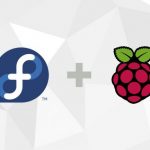
The Raspberry Pi computers are extremely popular. It isn't hard to see why people like them -- they are small, inexpensive, and very useful for various projects. While they are arguably under-powered for use as, say, a full-time workstation, the diminutive machines aren't really meant for that.
If you do want to use it as a workstation, however, I have good news. Fedora 25 Beta Workstation is now available for both the Raspberry Pi 2 and Raspberry Pi 3. In addition to the Workstation image, Fedora 25 Beta Server is available too. Owners of ARMv6-powered Pi models, such as the Pi Zero, are out of luck, as the operating system will not be made available for them.
Canonical gives Ubuntu Linux 17.04 the name 'Zesty Zapus' (jumping mouse)

Linux distributions and silly names go together like peanut butter and jelly. For whatever reason, the maintainers of these operating systems seem to enjoy having fun with what they call them -- some argue it is childish. Even Google -- a billion dollar company -- uses sugary dessert names for the Linux-based Android operating system.
One of the most well-known Linux distributions to use funny names is Ubuntu. It famously uses the convention of an adjective and a lesser-known animal, each starting with the same letter. The letter is chosen sequentially by alphabet. For example, Ubuntu 16.10 uses the letter "Y" -- "Yakkety Yak". The next version of the operating system will use the letter "Z". While many folks hoped for "Zebra", that would be too obvious. Instead, Canonical has chosen "Zesty Zapus". Don't know what a zapus is? Neither did I. It is apparently a type of jumping mouse. The selection was not made at random, however, as the company has an explanation for the decision.
Acer updates Chromebook 15 with 12-hour battery life -- $199 exclusively at Walmart

Chromebooks are not for everyone, but for many home users, it is absolute perfection. If you live in the web browser -- as many people do nowadays -- laptops running Google's Linux-based Chrome OS are a godsend because they are maintenance free. No need for confusing OS upgrades or anti-virus software. It just works, and it works well. Since they can now run Android apps too, they could become a serious threat to Microsoft and Windows 10.
One of the most attractive aspects of Chromebooks is price -- they are often quite affordable. Today, Acer refreshes its 15.6 inch Chromebook 15 with a mind-boggling 12 hours of battery life. Best of all? It starts at $199. Yes, this model will get Android app support in a future update too.
Google releases Open Source Report Card -- does the company deserve an A+?

The future of computing is open source. While there is still room for closed source software, more and more companies are going the open route. Major players such as Microsoft, Apple, and Facebook are all contributing to the open source community. Google in particular is a huge proponent of open source. Heck, two of the company's operating systems -- Chrome OS and Android -- are Linux distributions.
Today, the search giant announces the 'Open Source Report Card'. This is essentially a report that explains the details of its open source projects. Google is undoubtedly a major open source contributor, but the question is, what grade should the company get?
Ubuntu Linux 16.10 'Yakkety Yak' is here! Download the Windows 10 alternative now

Ubuntu is a wonderful operating system. Depending on your needs, it can be a better choice than Microsoft's Windows 10. More and more people live in the web browser, and Ubuntu can run both Chrome and Firefox. Need a word processor? The ability to edit spreadsheets? The wonderful LibreOffice is included -- no need to spend money on a subscription-based office package. There are countless free packages available too. You can even buy laptops pre-loaded with the OS from companies like Dell and System76.
Today, Ubuntu 16.10 'Yakkety Yak' sees release. It has many significant updates (you can read the release notes here), such as Linux kernel 4.8 and LibreOffice 5.2. The best part about this version of the operating system, however, is that it isn't exciting. Once again, home users will likely be bored by this Ubuntu upgrade, but that is a good thing -- Canonical does not do change for the sake of change.
System76 updates its affordable Ubuntu Linux 'Lemur' laptop with Intel Kaby Lake

Dell recently updated its XPS 13 Developer Edition laptop with Kaby Lake processors. While that company's laptop is beautiful, it is also very expensive. For developers and home users looking for a solid laptop running Ubuntu Linux, System76's 'Lemur' has historically been a great value. Not only is the affordable machine both powerful and well supported, but it is built like a tank too.
Today, System76 updates the aforementioned Lemur with Kaby Lake processors. While Dell's XPS 13 starts at $949, the Lemur begins at a much more reasonable $649.
Fedora 25 Beta open source Linux distribution now available for download

Fedora is the operating system of choice of Linux founder Linus Torvalds -- that says a lot. Despite the fact that he uses a Dell XPS 13 Developer Edition laptop that ships pre-loaded with Ubuntu, it is unlikely that he kept that OS on it. While there is nothing wrong with Canonical's offering, Fedora is a very wise choice for those who want a no-nonsense Linux distro with a focus on free and open source software.
Today, Fedora 25 Beta becomes available for download. There are many things to get excited about, such as the implementation of Wayland and the pre-release 3.22 version of the GNOME desktop environment.
GIGABYTE refreshes BRIX compact barebone PCs with 7th Gen Intel Kaby Lake processors
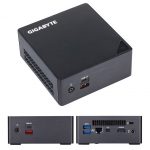
Size matters. Well, when it comes to computers, at least. Look, long gone are the days of having dedicated computer rooms where a family shares a single monstrous tower. With so many adults moving back home with their parents, houses and apartments are much more cramped, meaning fewer vacant rooms. True, a laptop can alleviate this, but so can a diminutive desktop. By taking up less space (some can even be VESA mounted to the rear of a monitor), a compact PC can allow a desk or table to serve other purposes than simply being home to a tower.
There are many choices in the compact PC market nowadays, such as the brilliant System76 Meerkat, or the new HP mini computers -- Wave and Slice. If you want a barebones system, however, GIGABYTE's BRIX line is a legit alternative to Intel's own NUC. Today, BRIX gets a refresh with all-new 7th Gen Intel 'Kaby Lake' Processors.
Ubuntu Core 16 Beta Linux distro for PC available now -- coming soon to Raspberry Pi
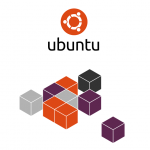
Ubuntu Core is a very different operating system than traditional Ubuntu. While both are Linux distributions, "Core" takes a different approach to package management, using modular "snaps". This way of computing is quite brilliant, as it removes dependencies and keeps everything in its own sort of sandbox. While the focus of Core seems to be the cloud and IoT devices, some people -- including yours truly -- see the writing on the wall. The Core design may eventually become the foundation of regular Ubuntu too.
Today, Canonical announces the latest Ubuntu Core 16 beta with feature freeze. If you are a home desktop Linux user, this is definitely not for you. Instead, this should be tested by developers and those that have a genuine use for Core.
Systemd vulnerability crashes Linux systems

A new vulnerability has been discovered that could shut down most Linux systems using a command short enough to fit in a tweet.
Linux administrator and founder of the security certificate company SSLMate Andrew Ayer discovered the bug, which has the potential to kill a number of critical commands while making others unstable just by entering the short command: NOTIFY_SOCKET=/run/systemd/notify systemd-notify "".
© 1998-2025 BetaNews, Inc. All Rights Reserved. Privacy Policy - Cookie Policy.